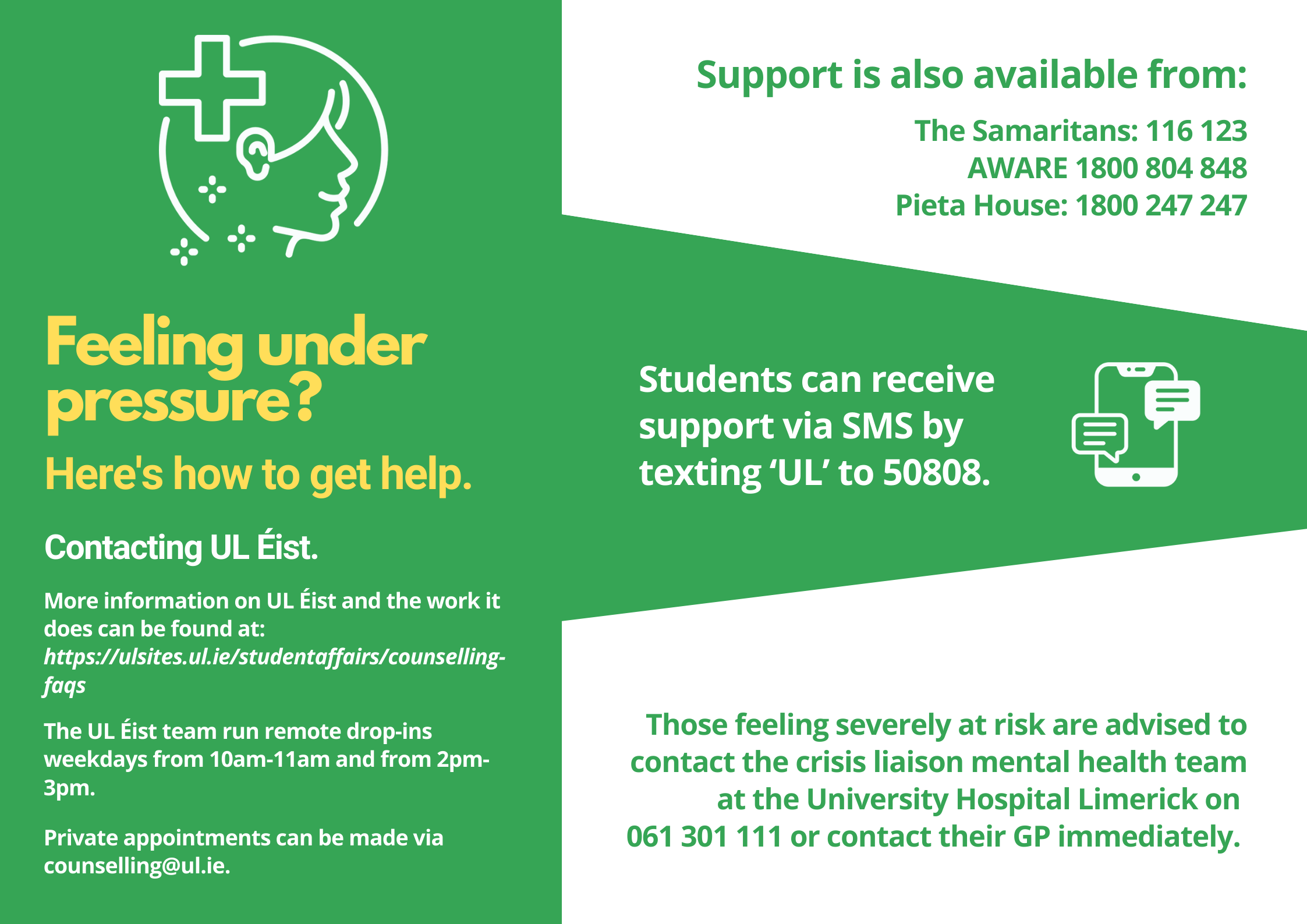STUDENT-RUN TWITTER PAGE HIGHLIGHTS MENTAL HEALTH STRUGGLES AT UNIVERSITY
“Sometimes when I get overwhelmed in the library I go to the bathroom, cry and look at this page as I remember I’m not alone.”
These words were submitted anonymously by a University of Limerick student to the popular UL-centric Twitter page UL Confessions.
The UL Confessions page was first launched in January 2020. It was set up as a light-hearted, anonymous look into the student experience at the University of Limerick.
Set up and run by an unknown student or students, it was, at its outset, an online space for the student body at UL to read and share the embarrassing and relatable moments that make up life at university. A series of universal memories and flashbacks to give the student population at large a hearty chuckle.
In recent months, this has changed.
A new trend has emerged in which more and more students are sharing their brushes with a darker side of the student experience.
An emerging trend.
Students at UL regularly submit posts to the anonymous account alluding to poor mental wellbeing, distress, anxiety, depression, and, on the rare occasion, suicidal ideation.
They do this through CuriousCat.qa, a service that allows users to exchange messages anonymously.
Reading over what began as a feed of largely light-hearted, tongue-in-cheek posts, a trend can now be clearly seen in content relating poor mental wellbeing and distress.
What are the implications of this anomaly?
Limerick Voice spoke with Dr Lucy Smith, Head of Counselling at UL Éist, in an effort to further understand what the implications of this trend in posts might mean.
UL Éist is an on-site (and online) counselling and wellbeing service offering support to students at the University of Limerick. It specialises in mental wellbeing, prevention, and coping whilst recognising distress.
More than 1,000 students (almost 7 percent of UL’s student body) turn to UL Éist each year for support.
Dr Smith believes the content appearing on UL Confessions may be emblematic of a general upward trend in student anxiety and distress since the beginning of the Covid-19 pandemic.
“We have had an increase in demand of 155% on this time last year. This is not to say that mental ill health for everyone has necessarily worsened, but it does point to heightened distress and worsening of personal contexts for many, which could in turn lead to an impact on mental health.”
She notes too how much of the content on UL Confessions mirrors common concerns the UL Éist team hear from students each year, as well as many new fears stemming from the Covid-19 pandemic.
“Typical concerns at the service pre-Covid include anxiety, low mood, friendships, and academic issues, amongst others.”
“Many students are talking [on the page] about issues that are either directly related to Covid or related in a less obvious way. This is on top of existing concerns that students have.”
“With Covid, we have additional issues like illness, loss, fear, further isolation, accommodation issues such as not being able to find any or being in poor accommodation and all the difficulties that brings, financial concerns, and isolation from not being able to socialise as normal.”
“Everyday I feel like a walking failure, depressed and suicidal.”
Loneliness, the inability to make meaningful friendships or romantic relationships, academic stress and pressure, anxiety, isolation, and depression all appear regularly as topics submitted by students to the UL Confessions page.
Some range from common shared feelings across the student experience, some are far more concerning, as these posts illustrate:
“Social anxiety is the only reason I don’t cry in public, my fear of being noticed is stronger than my need to release emotion.”
“I’m so afraid of being alone I go from friend to friend house etc but I guess I always am alone in the end ffs.”
“Final year is kicking my ass. Everyday I feel like a walking failure, depressed and suicidal. I’m not failing college work but I’m just tired. I want to graduate and be done with college. Nothing makes sense anymore and I’m just crying myself to sleep every day because I’m scared of disappointing my family. I’m overthinking everything and I’m just scared of failing.”
“The horrible feeling of having to go back to Limerick of a Sunday evening after spending all weekend at home is slowly setting in.”
“I’m really really lonely and I feel like such a burden on my friends because I clearly need them more than they need me.”
“My mental health has been spiralling for a long time and I’m not sure what to do about it, already used my counselling sessions with UL and can’t afford private care.”
These examples from the UL Confessions page are taken only from the past month.
Normalising common struggles.
Dr Smith acknowledged that pages like UL Confessions may provide some much-needed catharsis for students reading them.
There is potential in pages like these, where stresses and anxieties are shared on popular platforms, for students to realise they’re not alone in how they’re feeling.
In that way, conversations around poor mental wellbeing or experiences of distress and anxiety can become more normalised.
“Normalisation of experiences can be very helpful for people,” Dr Smith said.
“Knowing that others struggle to make friends or get a boyfriend/girlfriend, that others struggle with their course work or with disliking their course, feel isolated, feel fear of public speaking, etc., is useful.”
Could there be negative consequences?
At the same time as acknowledging the potential positive effects of normalising conversations around mental wellbeing among students, Dr Smith believes there can be negative consequences in sharing this kind of content too.
If posts aren’t screened with a clear duty of care to readers in mind, content could potentially be triggering to some who may be experiencing distress or who may have had traumatic experiences in the past.
“It helps people to not feel alien or alone when they know others carry similar concerns to them,” she said.
“However, seeing others in grave distress (e.g., references to feeling suicidal) could really upset people or spark upsetting memories, etc. It is important if posting that comments are not flippant.”
Dr Smith noted the ethical codes and duties of care other online forums and publications adhere to when posting or crowdsourcing content of this kind, commenting how many make clear guidelines for what is or isn’t acceptable and heavily moderate anything that may breach respect, safety, or responsibility where the public is concerned.
UL Confessions did not respond when asked to comment on the current trend within its content, so it’s unclear what screening or consideration processes it adheres to when sharing posts to its 6,500 followers.
Regardless, it does raise questions as to the current state of wellbeing of students at the University of Limerick and what responsibilities UL Confessions has to report warning signs to a more competent authority in cases of perceived crisis.
A common feature.
‘Confessions’ pages are a common feature across other Irish universities, with pages established by students at University College Cork, University College Dublin, Dublin City University, Maynooth University, National University of Ireland Galway, and more.
UL Confessions appears at this moment to be the most prolific confessions page coming from an Irish university.
While other university’s pages have tackled similar topics, the conversation around mental wellbeing is the loudest and most frequent on the UL page.
Originally published on November 24, 2021, in the Limerick Voice.
Let’s be social
Further reading
-
RT @raleighreports: Man arrested on suspicion of murdering woman in Limerick apartment https://t.co/zqkhsfvFUi via @limerickpost
-
I’ve heard it called many things, but ‘wild toileting’ is a new one in me.
-
RT @limerickpost: Death of woman in Limerick apartment is now a murder case - https://t.co/jbyp0UAELf https://t.co/6W3eK4JMfh

























